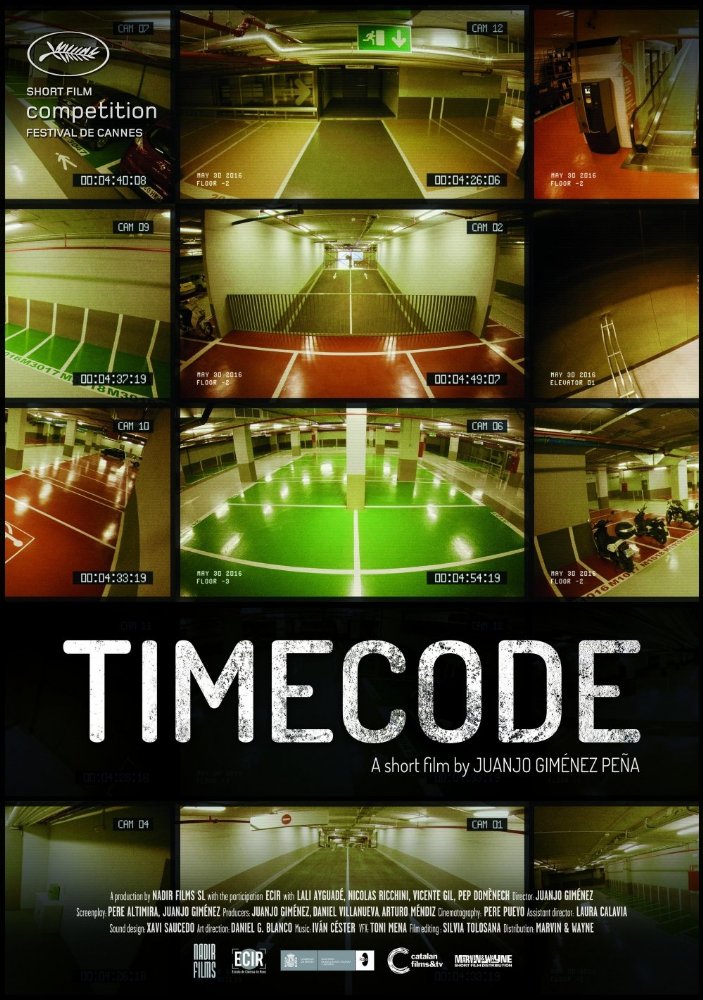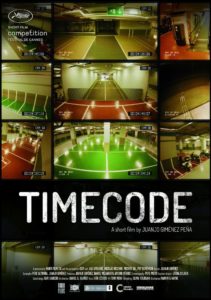
Short Film Review “Timecode”
WATCH THE TRAILER HERE
First, the Recap:
Shifts. A common enough concept when referring to the workplaces we all inhabit for a least some portion of the day each week. Whether by day or night, we all put in our time. We also know how uneventful and wearisome certain positions can be, and trying to pass the time when actual work isn’t exactly on the plate can be even more tedious. When faced with this, how do people cope? For daytime parking garage security guard Luna (Lali Ayguade), every day consists of the same old routine in arriving, clocking in, and a brief greeting with her night shift counterpart, Diego (Nicolas Ricchini), as he departs. Soon after, it is all monitors and very sparse interaction.
However, one new day brings with it a call from her supervisor, Jefe (Vicente Gil), advising of a customer complaint involving their vehicle. Intent on getting a resolution to the issue while on the call, Jefe holds while Luna looks up the security cam footage for the previous evening, surprised by what she ultimately discovers, yet likewise unable to share said findings with her boss. Dismissing it as effectively nothing, Luna chooses to go investigate the scene herself. Once there, though, she makes a decision that soon evolves into an ongoing “dialogue” between Diego and herself, with only specific timecodes left written on post-it notes each shift that they coordinate by. Eventually, as Jefe is introducing a new employee, Pipiolo (Pep Domenech), to his duties, the truth comes out.
Next, my Mind:
Director/co-writer/co-producer Juanjo Gimenez Pena’s 15-minute short intelligently, entertainingly, and very much uniquely delivers a creatively executed drama that takes the notion of “what actually happens in the workplace” to a whole different and effective level. Yet another offering in the running for the 2017 Oscar for Best Live Action Short Film, the narrative initially wouldn’t promise much when thinking about viewing the changing shifts of two parking garage security personelle. But, what becomes the magic of this is allowing it a chance to fully unfold before your eyes, as the mundane becomes an adventure in beautiful, fluid, imaginative, artistic expression that will pull you in, make you smile, and stare in wonder at what has emerged. Yet, it is also the mere simplicity of format, setting, music, and cinematography, plus some seriously skilled, well-choreographed lead actors, that makes everything come together beautifully.
Ayguade’s Luna is a wonderful exercise in seeing a character turn before your eyes from a gorgeous woman, to a somewhat “plain Jane” while at work, but then suddenly gorgeous in whole new ways within the same storyline and all in only 15 minutes. Her loyalty towards Diego and the subsequent connection they experience as they begin the timecode-based “conversations” and related actions is very well enacted by Ayguade. Likewise, Ricchini’s Diego is just your average working stiff who is employed at a truly thankless job until thanks to one night’s extracurricular events while on shift changes our entire perception of the man and how exactly he’s found a way to deal with monotony. Ricchini deftly navigates the character’s nuances with skill and ease. Plus, the sequences with the two actors together are nothing short of amazing. Add in Gil and Domenech’s perfectly timed moments of discovery as boss and new employee, it’s priceless.
With the wonderfully apropos musical efforts provided by composer Ivan Cester, “Timecode” yet again represents the incredible creative flow being experienced within the independent film ranks all over the world, and it is a pleasure to see that at least some of these projects are getting some just due via Oscar nods. For this reviewer, I honestly wish I could give them all the Oscar, but one at least hopes that this will shine an ever-brightening light on a sector of filmmaking that more than deserves a new age to blossom in the sun.
As always, this is all for your consideration and comment. Until next time, thank you for reading!




